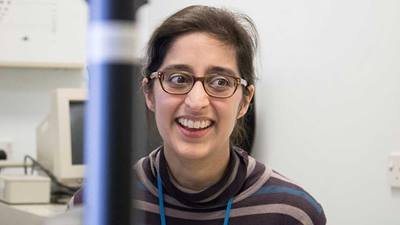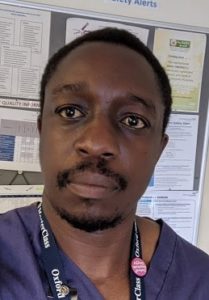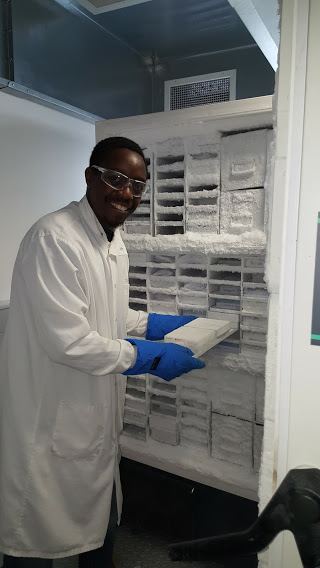Dr Jasleen Jolly
Jasleen Kaur Jolly is a Senior Clinical Research Fellow and optometrist in the University of Oxford’s Nuffield Department of Clinical Neurosciences, who has benefited from the support of the Oxford BRC throughout her career in Oxford, most recently on its Next Generation Leadership course.
Having graduated as an optometrist from Cardiff University, and with a career primarily in hospital care and experience in research in Australia, she completed her MSc in Investigative Ophthalmology and Vision Science in 2011 from University of Manchester. This led to her current job in Oxford.

Jasleen was funded by the Oxford BRC to work 50% in research and 50% in clinical work in the Oxford Eye Hospital; her research involved seeing patients taking part in clinical trials, especially the ocular gene therapy trials.
“Based on my experience increasing the understanding of the patients and the clinical trial process I developed my own research programme specialising in outcome measures and the psychological impact of vision loss,” she explains. “Using my experience and published work from the BRC role I was keen to apply for the NIHR clinical doctoral fellowship as my experience confirmed I wanted to pursue a career in clinical research.”
The NIHR’s Integrated clinical academic (ICA) programme did not acknowledge optometrists as allied health professionals so Jasleen provided evidence to get this changed and was then able to apply. In the meantime, she also accessed small grants to continue expanding her research work.
“Having the support of the BRC infrastructure and NIHR funded portfolio studies helped with this process,” she says. After she successfully completed the NIHR clinical doctoral fellowship, she obtained a clinical research fellowship from The College of Optometrists.
There has been another positive development in Jasleen’s career: she has been offered an associate professor position in the Vision and Eye Research Institute in Anglia Ruskin University, in Cambridge.
“One of the reasons they recruited me is how well I am embedded in the BRC and NIHR in Oxford, integrating the university and the hospital. They are keen for me to emulate this in vision research in Cambridge. The BRC-funded Next Generation Leadership course I am undertaking currently is invaluable in supporting me with the skills required for formally leading my own research group in my new role.”
Jasleen adds: “The BRC and NIHR have allowed me the opportunities to pursue a clinical academic career after several years of practicing. This has been invaluable, as it has allowed me to bring my previous clinical experience into my research and keep my research grounded in patient care. Without this support I would not have been able to realise my full potential and achieve as much as I have.”
Jasleen is passionate about creating inclusive workplaces and is involved in Equality, Diversity and Inclusion (EDI) initiatives at departmental, university and national levels.
James Chivenga

James’s current role is overseeing governance and consenting processes in the Biobank of the Translational Gastroenterology Unit (TGU), which is supported through the Oxford BRC’s Gastroenterology and Mucosal Immunity Theme. The TGU hosts teams of scientists and clinicians working to tackle major diseases affecting the gut and the liver, from colorectal cancer to inflammatory bowel disease or coeliac disease.
His role covers everything from overseeing all the ethical procedures to ensuring staff who consent patients are properly trained, or ensuring the safe storage and traceability of samples.
James graduated in Zimbabwe in 1999 in Biology and Biochemistry and obtained an MSc in Biotechnology from Oxford Brookes University in 2012, having studied for his Master’s while working as a technician at the University of Oxford’s Cancer Epidemiology Unit.
“After my Master’s, the natural progression was to look for research assistant posts, which got me into the TGU in 2013 as a research assistant in Holm Uhlig’s team,” he says. That job entailed consenting and collecting samples from participants.

Three years later, James was promoted to a more senior role in the team, and in 2021, James was given line management responsibility. “It’s a similar role to what I’ve been doing since 2016, but now I have to do PDRs,” he says.
A key step was doing the Oxford BRC’s Next Generation Leadership course, at the suggestion of his line manager.
“She knew I was interested in taking on a leadership role. So I applied and got on the course,” James explains.
“It was a really good experience, even if it was a little disrupted by the pandemic. But we did finish it, and I enjoyed it. We had some really good speakers, especially when they brought in senior people in the Trust and they described their pathway and how the organisation is trying to ensure that top leadership have leadership training, rather than simply being the longest-serving doctor. It was all very practical. The interactions around different topics among the teams was quite exciting. It opens up your mind and helps you analyse yourself as a character and how you engage with colleagues. It makes you look not only at yourself, but also your team and what kind of individuals they are, and how you tailor your interactions with them.”
Myra Malik

Myra Malik is a consultant anaesthetist who did an Oxford Healthtech Labs Global Insight Fellowship (GIF), which is supported by the Oxford Biomedical Research Centre. The GIF teaches fellows the Need-Led Innovation Process, an approach that establishes ‘needs’ of stakeholders as a way of bringing about change.
Myra trained as an anaesthetist, but took time out of her clinical practice to pursue other interests, starting with a full-time business degree. “That whetted my appetite about entrepreneurship and innovations, what healthcare could look like in the future,” Myra explains.
She then spent two years at a large NHS trust in London learning the methodologies and science behind organisational improvement. This helped her understand some of the challenges in healthcare, not least reconciling the different priorities of senior leaders and frontline clinicians.
She then spent a year as the Associate Medical Director of the Faculty of Medical Leadership and Management, whose remit is to develop healthcare leaders.
“I returned to – and completed – my anaesthetic training in 2017. What I was supposed to do next was get a consultant job, but I had a feeling there was something else I needed to do first. This fellowship came up and it seemed really exciting. In the past I would have dismissed it, but I thought ‘why not, it’s a fantastic opportunity – it may not come again?’,” Myra says.
It turned out that she had the right kind of experience and interests.
“I had been looking for a way to know what to do to innovate and I had been told you have to set up your own company and you’ll learn the hard way. But I wanted to develop solutions to problems that really existed. I know what the problems are that I have encountered, but what I didn’t know was how to translate that into a solution that would fit the problem. Those that are developing the solution are often remote from those that are experiencing the problem. For me, it’s about bridging that gap, and that’s what the fellowship offered,”
Myra went with two other fellows – an engineer and a lawyer – to Saint-Louis in north-western Senegal in February 2020, returning just before the first UK COVID-19 lockdown. They worked with a local hospital to develop a needs-led approach to innovation. This entails an immersion in a clinical environment, observing problems at first hand to understand why they have arisen, and then clearly define a measurable outcome.
“It was hugely outside my comfort zone. I was living in West Africa, I had to learn French. It was a valuable life experience,” she says.
“We carried out hundreds of observations and generated 400 needs statements and then narrowed that down to the top two or three needs and we are currently working on one of them – relating to weaning patients off mechanical ventilation, which is very apt at the moment. But it’s a problem that existed before COVID and will exist after COVID.”
The fellows were meant to be going back in summer 2020, but this wasn’t possible due to COVID-related travel restrictions. But their project is continuing, despite many challenges, and they are currently assembling a team to apply for further funding.
Myra is only the second woman and the first woman of colour to take part in the fellowship.
“The desire to collaborate across different disciplines is probably one of the best things for the BRC to continue to invest in”
Myra returned to clinical practice in October 2020 and now has a substantive consultant role. And despite the challenges, she has continued the project alongside her full-time clinical role.
Her interest in driving organisational improvements has also continued. She has joined the NHS Clinical Entrepreneur Programme, run by Prof Tony Young. “That’s a direct result of having done the fellowship and the project that has spun out from the fellowship,” she explains. The BRC funding and being part of the Oxford ‘ecosystem’ has afforded the fellows access to a useful network, which has meant that their project has been on three accelerator programmes.